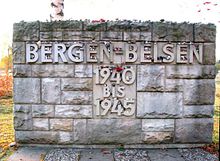Hélène Berr
Hélène Berr (born March 21, 1921 in Paris ; † April 1945 in the Bergen-Belsen concentration camp ) was a French Jew who recorded her experiences during the time of National Socialism in a diary that has become one of the most important testimonies from that time in France the Shoah applies.
Life
Hélène Berr came from a well-off Jewish family who had lived in France for many generations. She studied Russian and English literature at the Sorbonne . She was interested in music and played the violin . In June 1940, northern France was conquered and occupied by the Wehrmacht in the western campaign ; Paris was occupied without a fight . Berr was unable to take her final exam because the anti-Semitic laws of the Vichy regime denied her admission. Instead, she got involved as a volunteer social worker in the “General Union of Israelites in France” (Union générale des israélites de France, UGIF). She was arrested on March 8, 1944, and almost two weeks later - on the day of her 23rd birthday - deported from Drancy to Auschwitz with her parents . She died, weakened by typhoid fever and abuse, in April 1945, a few days before the camp was liberated, in the Bergen-Belsen concentration camp , where she had been evacuated.
diary
Berr began her recordings on April 7, 1942, at the age of 21 with an episode about the author Paul Valéry . At first there is no sign of the horror of anti-Semitism and the war. She raves about the landscape around Paris and talks about her first love and her friends at the Sorbonne University. In her texts, peppered with quotes from William Shakespeare and Lewis Carroll , the war appears at best as a bad dream. Gradually she becomes aware of her situation. She reports about the Star of David , evictions from the park and violence against her relatives and friends. She hears rumors about the gas chambers and complains about the lack of prospects: “We live from hour to hour, not even from week to week.” A deported Jew tells her about the plans of the National Socialists. The last post is about a conversation with a German prisoner of war. The diary ends on February 15, 1944 with the words from Shakespeare's Macbeth : “Horror! Horror! Horror! ”(See German edition, page 316.) On a March evening in 1944, Hélène Berr and her parents did not want to go to a hiding place for the night as they had often before and stayed at home. They were arrested the next morning and later deported.
Berr ordered that after her death, her notes should be given to her fiancé Jean Morawiecki, who later made a career as a diplomat. In 1994 he left the diary, which consists of 262 loose pages, to her niece Mariette Job. She handed the diary to the Shoah memorial in 2002 and later decided to publish it.
The book was first published in France in January 2008. The newspaper Libération wrote shortly before publication, it'll "literary event of the New Year 2008" and recalled the heated debate surrounding the two years previously published book of Jewish author Irène Némirovsky . The first edition of 24,000 copies was sold out within two days. Over 80,000 copies of the diary were sold in the first year. In February 2009 the German edition Pariser Tagebuch 1942-1944 was published (translator: Elisabeth Edl ).
See also
expenditure
-
Journal, 1942–1944 , foreword by Patrick Modiano , Éditions Tallandier 2008 ISBN 978-2-84734-500-1 , Préface du «Journal» d'Hélène Berr (PDF) (French).
- Journal . Translated by David Bellos . Quercus , London 2008, ISBN 978-1-84724-574-8 , ISBN 978-1-84724-575-5 .
- Paris Diary 1942–1944 . Foreword by Patrick Modiano. Translated by Elisabeth Edl. Carl Hanser Verlag , Munich 2009, ISBN 978-3-446-23268-6 .
literature
- Mechthild Gilzmer: Three Jewish testimonies from the time of persecution. "Because the others need to know ..." , in Francia. Research on Western European History . Volume 37, 2010 full text
Web links
- Literature by and about Hélène Berr in the catalog of the German National Library
- France finds its own Anne Frank as young Jewish woman's war diary hits the shelves . In: The Observer , January 6, 2008 (English)
- Helene Berr's Holocaust Diary Flies Off the Shelves SpiegelOnline International, January 9, 2008 (English)
- Student's Diary Tells of Occupied Paris , Excerpts from 'Helene Berr Journal', Jewish student's diary on Nazi occupation of Paris . wn.com, January 10, 2008, (English)
Individual evidence
- ↑ a b c d Martina Meister: horror and greatness . In: Die Zeit , No. 7/2009, p. 54.
- ↑ a b FAZ.net February 4, 2009 / Joseph Hanimann: Cheer up, you are prettier
- ^ "Ce sera l'événement éditorial du début de l'année 2008.", La vie brève . In: Liberation , December 20, 2007
- ↑ Intimate and painful . In: Der Spiegel . No. 3 , 2008, p. 94 ( online ).
- ↑ "One cannot praise the Hanser Verlag enough for having taken on this contemporary document, which is also a literary gem." Ina Hartwig : "A happy one must die" (first in Frankfurter Rundschau , March 10, 2009), in: The secret compartment is open. About literature . S. Fischer, Frankfurt 2012 ISBN 3-10-029103-4 , pp. 59–63, here p. 63.
- ^ Next to Berr about Henri Brunswic (Heinrich Braunschweig), who grew up in Heidelberg, and about Jacqueline Mesnil-Amar
| personal data | |
|---|---|
| SURNAME | Berr, Hélène |
| BRIEF DESCRIPTION | French Jewish woman, diary writer |
| DATE OF BIRTH | March 21, 1921 |
| PLACE OF BIRTH | Paris |
| DATE OF DEATH | April 1945 |
| Place of death | Bergen-Belsen concentration camp |

